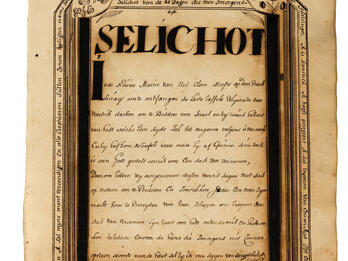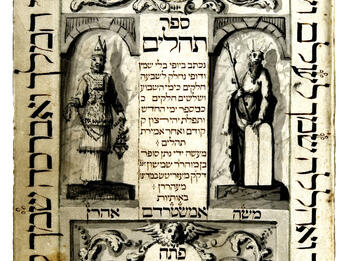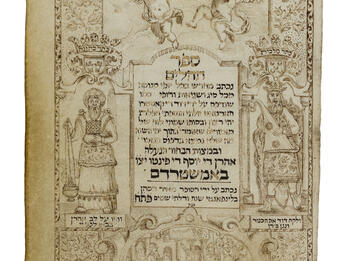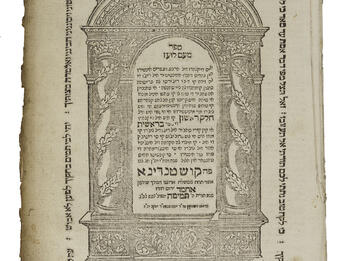Yiddish Translation of Isaac Aboab’s Menorat ha-ma’or
Moses Frankfurt said: The holy Torah tells us that the Holy One commanded Moses to interpret the Torah very plainly (Deuteronomy 27:8), to explain it clearly in seventy languages so that all nations may learn the Torah and know how to serve God [ . . . ] and this they know through the translation of the Torah into all languages. [ . . . ]
And if we discover that God Himself commanded the nations of the world, who did not receive the Torah, all the more so does this apply to the children of Israel, who are known as a holy people unto the Lord (Deuteronomy 7:6), that they must understand the Torah and know how to perform all the commandments and be familiar with their content. [ . . . ]
There can be no other way, for one must understand the foundation of the Torah and the commandments without any doubt. Therefore, many books have been written in all languages, as we will see shortly, so that in every land in which the nation of Israel is dispersed they will know and understand the Torah, its source, and how to perform the commandments as God ordered, and that a person may follow the right principles and behave courteously, avoid sin, and turn away from evil deeds, and also that he will understand what it means to do good and he will do good, and thus will merit all the good qualities that spring forth from this. All this [is possible] because it is explained in simple language and therefore is easily understood. Thus one can follow the right path and merit eternal life.
And this caused me to take upon myself the great endeavor of translating this highly prized book, Sefer menorat ha-ma’or into Yiddish [lit. “the language of Ashkenaz”].
Therefore I decided and considered that, because in my youth God granted me the great merit of composing a commentary on Menorat ha-ma’or, now I will undertake a task to benefit the masses and translate it into Yiddish, in straightforward language, so that everyone will be able to understand it. Although it will be very difficult for me, considering the great effort it involves and the long time required to translate everything correctly, in particular because it includes many passages from the Talmud and midrashim, which must be properly explained for the simple man, and also women. Thus, I trusted in God that He would give me strength to complete this task, and the merits of the masses certainly stood at my side, and with God’s help I completed it.
And therefore, I wrote these words in this introduction, because I have heard that some scholars believe it is wrong to translate into Yiddish works such as these, which reveal to each and every person matters found in midrashim and the Talmud. Thus, I have revealed to them that the opposite is true. It is a commandment to prepare holy books in all languages so that a person who is unfamiliar with the holy tongue may study in his own language, and he will receive a reward as though he learned in the holy tongue, just as the pious man, our rabbi, Isaiah [Horowitz] wrote in [Shene luḥot ha-brit]. I showed them that R. Isaac Aboab too, the author of Menorat ha-ma’or, translated his work into Spanish.
Moreover, I wish to reveal to them something even greater. Many of our holy books, among them the most complicated and difficult to study, were not written in the holy tongue but rather in the language that the simple man spoke; the Jerusalem Talmud was written in the language spoken by men, women, and children in the land of Israel and not in the holy tongue. Likewise, our Talmud, which is called the Babylonian Talmud, contains many sections not written in Hebrew. The Midrash Rabbah includes much that is not in Hebrew, but rather the book was written in the languages spoken by the simple man in these lands; Targum Jonathan and Targum Yerushalmi, which involve many secrets, were written in simple language, so that everyone could comprehend them. The Zohar is a holy and very awesome book, which contains the deepest secrets of the Torah; it was written not in the holy tongue but rather in the language spoken in the land of Babylon [Aramaic]. There are many more such books—although there is not enough space here to mention all of them—which were not written in Hebrew but rather in the same languages that people spoke at the time in the lands where they were composed.
From this, the coming generations learned to act in the same way, for example the Rambam [Maimonides] wrote a commentary on the Mishnah in Arabic, in addition to his Guide of the Perplexed and the Eight Chapters, as well as other books which he composed. Duties of the Heart is a very important book written by R. Baḥya [Ibn Pakuda] in Arabic, and similarly a few hundred books, all of which were penned in simple languages in order that everyone should know and discern the wisdom of the Torah and be able to serve God appropriately.
And behold, I must note why I noted in German where in the Talmud the matter is found, which sage said it, and what was his name. This I did for two reasons. One is that a person is obligated to say something in the name of its speaker. This gives pleasure to the sage in the land of the living, and also is a merit for the people, because it brings the redemption [One who says something in the name of its speaker brings redemption to the world (m. Avot 6:6)]. And the other reason is that R. Isaiah writes that it is a great segulah [magical remedy] for the soul when a person mentions the names of the tractates of the Talmud and the names of the Tannaim and Amoraim [sages of the Mishnah and Talmud], because it lights up the soul with its holiness. Therefore, despite the great effort, I decided to do this in order to benefit the people in the best possible way. Perhaps I also will receive a reward for this; payment is according to the trouble expended.
Translated by
.
Credits
Moses Frankfurter, “Preface (Yiddish)” in Sefer Menorat ha-ma’or, by Isaac Aboab, trans. Moses Frankfurter (Mets: Bi-defus A. Hadamar, 1829), preface.
Published in: The Posen Library of Jewish Culture and Civilization, vol. 5.






